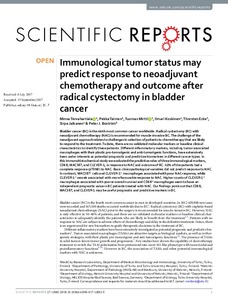Immunological tumor status may predict response to neoadjuvant chemotherapy and outcome after radical cystectomy in bladder cancer
Tervahartiala M; Taimen P; Mirtti T; Koskinen I; Ecke T; Jalkanen S; Bostrom PJ
Immunological tumor status may predict response to neoadjuvant chemotherapy and outcome after radical cystectomy in bladder cancer
Tervahartiala M
Taimen P
Mirtti T
Koskinen I
Ecke T
Jalkanen S
Bostrom PJ
NATURE PUBLISHING GROUP
Julkaisun pysyvä osoite on:
https://urn.fi/URN:NBN:fi-fe2021042717249
https://urn.fi/URN:NBN:fi-fe2021042717249
Tiivistelmä
Bladder cancer (BC) is the ninth most common cancer worldwide. Radical cystectomy (RC) with neoadjuvant chemotherapy (NAC) is recommended for muscle-invasive BC. The challenge of the neoadjuvant approach relates to challenges in selection of patients to chemotherapy that are likely to respond to the treatment. To date, there are no validated molecular markers or baseline clinical characteristics to identify these patients. Different inflammatory markers, including tumor associated macrophages with their plastic pro-tumorigenic and anti-tumorigenic functions, have extensively been under interests as potential prognostic and predictive biomarkers in different cancer types. In this immunohistochemical study we evaluated the predictive roles of three immunological markers, CD68, MAC387, and CLEVER-1, in response to NAC and outcome of BC. 41% of the patients had a complete response (pT0N0) to NAC. Basic clinicopathological variables did not predict response to NAC. In contrast, MAC387(+) cells and CLEVER-1(+) macrophages associated with poor NAC response, while CLEVER-1(+) vessels associated with more favourable response to NAC. Higher counts of CLEVER-1+ macrophages associated with poorer overall survival and CD68(+) macrophages seem to have an independent prognostic value in BC patients treated with NAC. Our findings point out that CD68, MAC387, and CLEVER-1 may be useful prognostic and predictive markers in BC.
Kokoelmat
- Rinnakkaistallenteet [27094]
